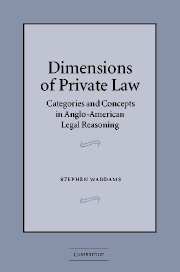Book contents
- Frontmatter
- Contents
- Preface
- Table of cases
- 1 Introduction: the mapping of legal concepts
- 2 Johanna Wagner and the rival opera houses
- 3 Liability for economic harms
- 4 Reliance
- 5 Liability for physical harms
- 6 Profits derived from wrongs
- 7 Domestic obligations
- 8 Interrelation of obligations
- 9 Property and obligation
- 10 Public interest and private right
- 11 Conclusion: the concept of legal mapping
- Works cited
- Index
8 - Interrelation of obligations
Published online by Cambridge University Press: 15 July 2009
- Frontmatter
- Contents
- Preface
- Table of cases
- 1 Introduction: the mapping of legal concepts
- 2 Johanna Wagner and the rival opera houses
- 3 Liability for economic harms
- 4 Reliance
- 5 Liability for physical harms
- 6 Profits derived from wrongs
- 7 Domestic obligations
- 8 Interrelation of obligations
- 9 Property and obligation
- 10 Public interest and private right
- 11 Conclusion: the concept of legal mapping
- Works cited
- Index
Summary
In law, as in history, there is a complex interdependence between the particular and the general. Particular instances are analysed and understood in the light of general concepts, but the general concepts themselves have drawn their form and substance from the aggregation of particular instances. The preceding chapters have shown that many legal issues have been resolved not by subordination to a single concept but by the concurrent influence of several. This does not by any means show that concepts have been unimportant (indeed it shows the opposite) nor that they are reducible to a single inscrutable mass, but it does show that they have often interacted with each other, and that they cannot therefore be fully understood without attention to their mutual interdependence. The concepts are distinct, but in respect of many issues they have operated concurrently, influencing each other. Thus, breach of contract has been treated in Anglo-American law (differing in this respect from many other systems) as a wrong, but it cannot be entirely subordinated to the idea of wrongdoing. Even where there is no contract, the disappointment of economic expectations has sometimes been treated as a wrong, but it is not a wrong that can be understood in isolation from other concepts. Taking undue advantage of an inequality of bargaining power, or of a fundamental mistake, or retaining a benefit without rendering an anticipated benefit in exchange may cause unjust enrichments, but the law on these questions cannot be understood in terms of unjust enrichment alone.
- Type
- Chapter
- Information
- Dimensions of Private LawCategories and Concepts in Anglo-American Legal Reasoning, pp. 142 - 171Publisher: Cambridge University PressPrint publication year: 2003



